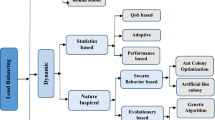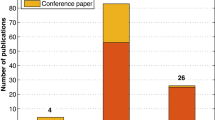Abstract
The Frequency Assignment Problem (fap) is one of the key issues in the design of Global System for Mobile Communications (gsm) networks. The formulation of the fap used here focuses on aspects that are relevant to real gsm networks. In this paper, we adapt a parallel model to tackle a multiobjectivised version of the fap. It is a hybrid model which combines an island-based model and a hyperheuristic. The main aim of this paper is to design a strategy that facilitates the application of the current best-behaved algorithm. Specifically, our goal is to decrease the user effort required to set its parameters. At the same time, the usage of such an algorithm in parallel environments was enabled. As a result, the time required to attain high-quality solutions was decreased. We also conduct a robustness analysis of this parallel model. In this analysis we study the relationship between the migration stage of the parallel model and the quality of the resulting solutions. In addition, we also carry out a scalability study of the parallel model. In this case, we analyse the impact that the migration stage has on the scalability of the entire parallel model. Computational results with several real network instances have validated our proposed approach. The best-known frequency plans for two real-world network instances are improved with this strategy.














Similar content being viewed by others
References
Aardal KI, Hoesel SPMV, Koster AMCA, Mannino C, Sassano A (2007) Models and solution techniques for frequency assignment problems. Ann Oper Res 153(1):79–129
Abbass HA, Deb K (2003) Searching under multi-evolutionary pressures. In: Proceedings of the fourth conference on evolutionary multi-criterion optimization, Springer, Berlin, pp 391–404
Amaldi E, Capone A, Malucelli F, Mannino C (2006) Optimization problems and models for planning cellular networks. In: Resende MGC, Pardalos PM (eds) Handbook of optimization in telecommunication, Springer, Berlin, pp 917–939
Brockhoff D, Friedrich T, Hebbinghaus N, Klein C, Neumann F, Zitzler E (2007) Do additional objectives make a problem harder? In: Proceedings of the 9th annual conference on genetic and evolutionary computation, ACM, New York, NY, GECCO ’07, pp 765–772
Bui L, Abbass H, Branke J (2005) Multiobjective optimization for dynamic environments. In: Proceedings of the 2005 IEEE congress on evolutionary computation, CEC 2005, vol 3, pp 2349–2356
Burke EK, Kendall G, Newall J, Hart E, Ross P, Schulenburg S (2003) Handbook of meta-heuristics. Hyper-heuristics: an emerging direction in modern search technology. Kluwer, Dordrecht
Burke EK, Hyde M, Kendall G, Ochoa G, Ozcan E, Woodward JR (2010) A classification of hyper-heuristics approaches. In: Gendreau M, Potvin JY (eds) Handbook of metaheuristics, international series in operations research & management science, vol 57, 2nd edn, chap 15, Springer, Berlin, pp 449–468
Colombo G, Allen S (2007) Problem decomposition for minimum interference frequency assignment. In: Proceedings of the 2007 IEEE congress on evolutionary computation, CEC 2007, pp 3492–3499
Cowling P, Kendall G, Soubeiga E (2001a) A parameter-free hyperheuristic for scheduling a sales summit. In: Proceedings of 4th metahuristics international conference (MIC 2001), Porto, Portugal, pp 127–131
Cowling PI, Kendall G, Soubeiga E (2001b) A hyperheuristic approach to scheduling a sales summit. In: Selected papers from the third international conference on practice and theory of automated timetabling III, Springer, London, UK, PATAT ’00, pp 176–190
Deb K, Pratap A, Agarwal S, Meyarivan T (2002) A fast and elitist multiobjective genetic algorithm: NSGA-II. IEEE Trans Evol Comput 6:182–197
Demšar J (2006) Statistical comparison of classifiers over multiple data sets. J Mach Learn Res 7:1–30
Eiben AE, Smith JE (2008) Introduction to evolutionary computing (natural computing series). Springer, Berlin
Hale W (1980) Frequency assignment: theory and applications. Proc IEEE 68(12):1497–1514
Handl J, Lovell SC, Knowles J (2008) Multiobjectivization by decomposition of scalar cost functions. In: Proceedings of the 10th international conference on parallel problem solving from nature: PPSN X, Springer, Berlin, pp 31–40
Hoos H, Stützle T (2005) Stochastic local search: foundations and applications. The Morgan Kaufmann Series in Artificial Intelligence, Morgan Kaufmann Publishers, Los Altos
Ishibuchi H, Hitotsuyanagi Y, Nojima Y (2007) An empirical study on the specification of the local search application probability in multiobjective memetic algorithms. In: Proceedings of the 2007 IEEE Congress on Evolutionary Computation, CEC 2007, pp 2788–2795
Knowles JD, Watson RA, Corne D (2001) Reducing local optima in single-objective problems by multi-objectivization. In: Proceedings of the first international conference on evolutionary multi-criterion optimization. Springer, London, pp 269–283
Kuurne AMJ (2002) On GSM mobile measurement based interference matrix generation. In: IEEE 55th vehicular technology conference, VTC Spring 2002, pp 1965–1969
Le MN, Ong YS, Jin Y, Sendhoff B (2009) Lamarckian memetic algorithms: local optimum and connectivity structure analysis. Memet Comput 1(3):175–190
León C, Miranda G, Segura C (2009) METCO: a parallel plugin-based framework for multi-objective optimization. Int J Artif Intell Tools 18(4):569–588
Luna F, Blum C, Alba E, Nebro A (2007) ACO vs EAs for solving a real-world frequency assignment problem in GSM networks. In: Proceedings of the 2007 genetic and evolutionary computation conference, pp 94–101
Luna F, Nebro A, Alba E, Durillo J (2008) Solving large-scale real-world telecommunication problems using a grid-based genetic algorithm. Eng Optim 40(11):1067–1084
Luna F, Estébanez C, León C, Chaves-González J, Nebro A, Aler R, Segura C, Vega-Rodríguez M, Alba E, Valls J, Miranda G, Gómez-Pulido J (2011) Optimization algorithms for large-scale real-world instances of the frequency assignment problem. Soft Comput 15(5):975–990
Mannino C, Sassano A (2003) An enumerative algorithm for the frequency assignment problem. Discrete Appl Math 129(1):155–169
Mouly M, Paulet MB (1992) The GSM system for mobile communications. Mouly et Paulet, Palaiseau
Mouret JB (2011) Novelty-based multiobjectivization. In: Doncieux S, BredFche N, Mouret JB (eds) New horizons in evolutionary robotics, studies in computational intelligence, vol 341. Springer, Berlin, pp 139–154
Özcan E, Basaran C (2009) A case study of memetic algorithms for constraint optimization. Soft Comput Fusion Found Methodol Appl 13(8):871–882
Press WH, Flannery BP, Teukolsky SA, Vetterling WT (1992) Numerical recipes in C: the art of scientific computing. Cambridge University Press, Cambridge
Segredo E, Segura C, León C (2011) A multiobjectivised memetic algorithm for the frequency assignment problem. In: Proceedings of the 2011 IEEE congress on evolutionary computation, CEC 2011. pp 1132–1139
Segura C, Miranda G, León C (2010) Parallel hyperheuristics for the frequency assignment problem. Memet Comput 3(1):1–17
Segura C, Segredo E, González Y, León C (2011a) Multiobjectivisation of the antenna positioning problem. In: International symposium on distributed computing and artificial intelligence, advances in intelligent and soft computing, vol 91. Springer, Berlin, pp 319–327
Segura C, Segredo E, León C (2011b) Parallel island-based multiobjectivised memetic algorithms for a 2D packing problem. In: Proceedings of the 13th annual conference on Genetic and evolutionary computation, ACM, New York, NY, USA, GECCO ’11, pp 1611–1618
Simon MK, Alouini MS (2005) Digital communication over fading channels: a unified approach to performance analysis. Wiley, Hoboken
Talbi EG (2002) A taxonomy of hybrid metaheuristics. J Heuristics 8(5):541–564
Toffolo A, Benini E (2003) Genetic diversity as an objective in multi-objective evolutionary algorithms. Evol Comput 11:151–167
Veldhuizen DAV, Zydallis JB, Lamont GB (2003) Considerations in engineering parallel multiobjective evolutionary algorithms. IEEE Trans Evol Comput 7(2):144–173
Vink T, Izzo D (2007) Learning the best combination of solvers in a distributed global optimization environment. In: Proceedings of Advances in Global Optimization: Methods and Applications (AGO), Mykonos, Greece, pp 13–17
Walke BH (2002) Mobile radio networks: networking, protocols and traffic performance. Wiley, Hoboken
Yoshino J, Ohtomo I (2005) Study on efficient channel assignment method using the genetic algorithm for mobile communication systems. Soft Comput Fusion Found Methodol Appl 9:143–148
Acknowledgments
This work was supported by the ec (feder) and the Spanish Ministry of Science and Innovation as part of the ‘Plan Nacional de i+d+i’, with contract number tin2011-25448. The work of Carlos Segura was funded by grant fpu-ap2008-03213. The work of Eduardo Segredo was funded by grant fpu-ap2009-0457x The work has also been funded by the hpc-europa2 project (project number: 228398) with the support of the European Commission—Capacities Area—Research Infrastructures. This work made use of the facilities of hector, the uk’s national high-performance computing service, which is provided by uoe hpcx Ltd at the University of Edinburgh, Cray Inc and nag Ltd, and funded by the Office of Science and Technology through epsrc’s High End Computing Programme.
Author information
Authors and Affiliations
Corresponding author
Additional information
Communicated by A-A. Tantar.
Rights and permissions
About this article
Cite this article
Segura, C., Segredo, E. & León, C. Scalability and robustness of parallel hyperheuristics applied to a multiobjectivised frequency assignment problem. Soft Comput 17, 1077–1093 (2013). https://doi.org/10.1007/s00500-012-0945-y
Published:
Issue Date:
DOI: https://doi.org/10.1007/s00500-012-0945-y




